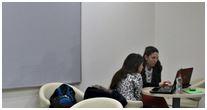A center for the study of language from a multidisciplinary perspective
Vision
In August 2010, the Standing Committee of the Hebrew University of Jerusalem voted to create a new research center, the Language, Logic and Cognition Center (LLCC), for the study of language from a multidisciplinary perspective. The research at the center will focus in particular on the relation between language and other human cognitive systems involved in logical reasoning and their relation to communicative events.
The LLCC promotes research integrating analytic tools from theoretical linguistics, philosophical logic, philosophy of language, cognitive science, brain sciences and computer sciences. The basic idea behind the establishment of LLCC was to promote interaction between scholars in these various fields with the aim of educating a generation of students with a firm background in related areas, who will be appropriately trained to engage in groundbreaking interdisciplinary research.
Background
In the 1950's and 1960's, at the beginning of what is often called "the cognitive revolution", researchers from mathematics, philosophy, philosophical logic, psychology and linguistics began to employ tools from formal logic, information theory and the theory of computation for the investigation of basic questions about human nature, and in particular, the human ability to use language in an unlimited way to express new thoughts appropriate to a range of situations. The assumptions common to those involved in this research were that one could build models of unobserved mental constructs on the basis of observed human behavior and explain aspects of the latter by appeal to the former. The application of this way of thinking in the study of language paves the way to their use in other areas of cognition.

During the following decades, however, researchers tended to work along sharply divided disciplinary lines, developing distinct formal tools and theories, a situation which led to a dearth of interdisciplinary interaction. More recently, interdisciplinary research has begun to emerge, as the tools of formal logic developed within philosophy were harnessed for the analysis of natural language semantics. The study of natural language semantics has as its focus the modeling of the knowledge, on the basis of which people assign meanings to an unlimited range of sentences in their language and determine how these meanings are appropriate to diverse contexts. This study has deepened our understanding of language and cognition and has simultaneously led to the development of formal and philosophical theories that have independent interest and an even wider range of applications.
These developments have to do with the modeling of knowledge put to use by speakers of language. In order to form a complete picture of human cognitive capacities, it is necessary to determine two more things: how these models are implemented in actual use at a functional / behavioral level; and how these processes are implemented at a physiological / neurological level. It is clear that theories developed at each level need to be checked and made compatible with theories at other levels. Researchers dealing with the modeling of knowledge tend to be affiliated with the disciplines of linguistics and philosophy. Those dealing with use at a functional level tend to be affiliated with psychology and those dealing with the implementation of these processes at a physiological level are usually affiliated with programs in brain sciences, neuro-anatomy, computer science etc. It is only recently that researchers have emerged with sufficiently sophisticated training in more than one area, so that they can participate in the interdisciplinary work necessary for providing a fuller picture of the relevant cognitive capacities. With this background in mind, we intend the LLCC to promote precisely those interdisciplinary initiatives which will lead to groundbreaking results.
Research Activities
The LLCC provides the infrastructure and services necessary for creating an atmosphere which promote the core areas of research and encourage interdisciplinary cooperation among members, fellows and students affiliated with the Center. The LLCC encourages: Personal and joint projects of researchers involving the graduate students; Working groups consisting of members, fellows, guests and students, that convene regularly in order to develop a defined problem; Workshops dedicated to the analysis of problems at the forefront of research; A colloquium for the presentation of research of the members and for introductory courses in various subfields; International conferences for the presentation of state of the art research in particular areas of research.

Program of Activities
The LLCC is responsible for a program for outstanding students. The aim of the program is to train extremely promising students in the core areas of interest, thus enabling the students to engage in groundbreaking interdisciplinary research. The program of study includes advanced courses in syntax, semantics and philosophical logic. In addition, advanced courses in philosophy of language, pragmatics, neuro-linguistics, psycholinguistics and a seminar in cognitive science are offered regularly. We envision the courses offered by the LLCC to be open to research students in programs throughout the university.
